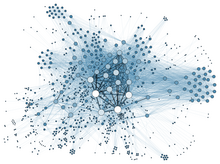
Social contagion involves behaviour, emotions, or conditions spreading spontaneously through a group or network. The phenomenon has been discussed by social scientists since the late 19th century, although much work on the subject was based on unclear or even contradictory conceptions of what social contagion is, so exact definitions vary. Some scholars include the unplanned spread of ideas through a population as social contagion, though others prefer to class that as memetics. Generally social contagion is understood to be separate from the collective behaviour which results from a direct attempt to exert social influence.
Two broad divisions of social contagion are behavioural contagion and emotional contagion. The study of social contagion has intensified in the 21st century. Much recent work involves academics from social psychology, sociology, and network science investigating online social networks. Studies in the 20th century typically focused on negative effects such as violent mob behaviour, whereas those of the 21st century, while sometimes looking at harmful effects, have often focused on relatively neutral or positive effects like the tendency for people to take action on climate change once a sufficient number of their neighbours do.